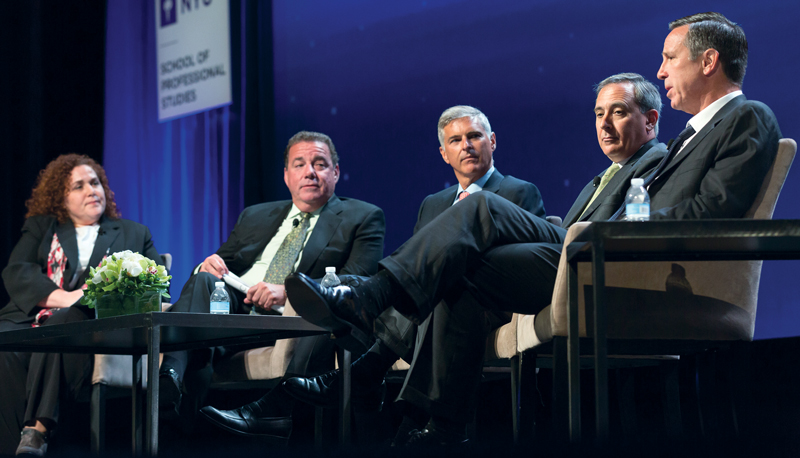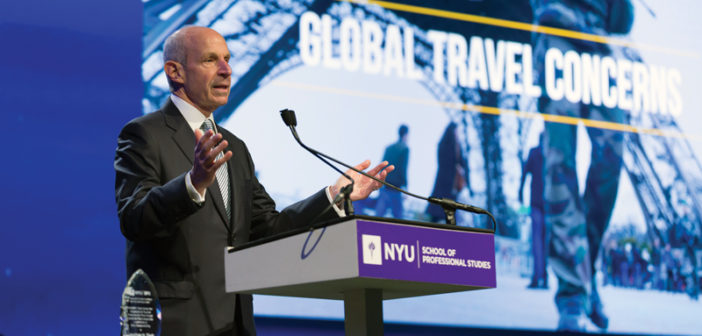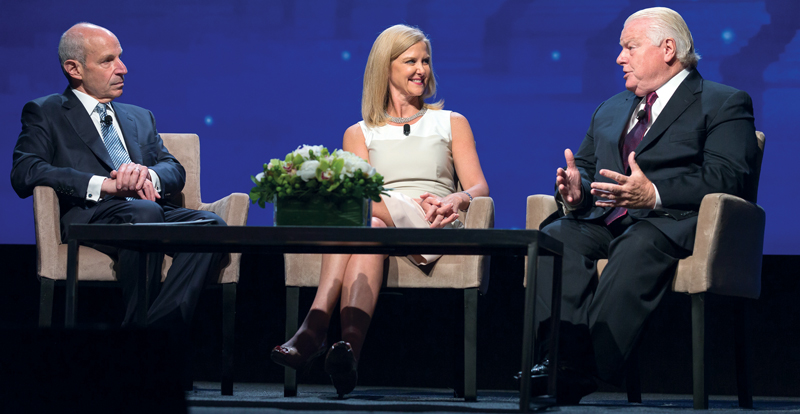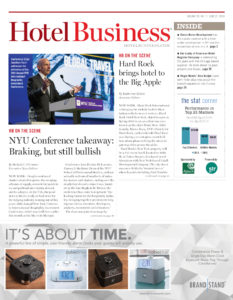NEW YORK—Despite continued chatter about disrupters, the creeping advance of supply, concern for pandemics and political uncertainty abroad, and to a degree, in the U.S., the good news is there’s really no bad news for the lodging industry coming out of this year’s 38th Annual New York University International Hospitality Investment Conference, which was held here earlier this month at the Marriott Marquis.
Conference host Dennis Di Lorenzo, Harvey J. Stedman Dean of the NYU School of Professional Studies, enthusiastically welcomed hundreds of industry movers and shakers, noting over the nearly four decades since it was founded by the late Stephen W. Brener, the conference has come to represent “the leading forum for the hospitality industry, bringing together preeminent lodging executives, investors, developers, analysts, economists and educators.”
The dean was joined on stage by new NYU President Andrew Hamilton to recognize the efforts of Jonathan M. Tisch, co-chairman of the board and office of the president, Loews Corp., and chairman/CEO of Loews Hotels, who served as conference chair for the 22nd year. In a two-fold honor, Hamilton officially renamed the school’s hospitality education arm the Jonathan M. Tisch Center for Hospitality and Tourism (it previously bore Tisch’s father’s name) and presented him with the inaugural Jonathan Tisch Award for Leadership in Civic Responsibility. The award subsequently will be presented each year to an industry leader and NYU student who show “exceptional civic engagement,” said Hamilton.
Seguing to his keynote address, Tisch exhorted the industry again this year to show its strength as a cohesive force in order to drive change, particularly in this election year.
In addition to improving the country’s infrastructure, impactors he cited affecting lodging included so-called disrupters, such as the migration to mobile, Airbnb, OTAs and global travel concerns, such as terror incidents, many of which attack travel targets.
“Beyond individual travel concerns, this directly affects business decisions as well,” said Tisch. “Hotels are now considered soft targets, and companies must carefully weigh the risks when deciding to expand to different parts of the world. It’s also prompting a new round of investments in security upgrades and personnel.”
Additionally, global health concerns are in focus, with attention currently centered on the Zika virus, which is linked to birth defects. Travel warnings for more than a dozen destinations, including Puerto Rico, have resulted in occupancy drops.
Increasingly long lines at U.S. airports, which Tisch suggested can be alleviated by encouraging traveler sign-up for TSA Pre-Check, also is in the disrupter mix.
Politics and government got attention, with Tisch noting the “rise in political turbulence and troubling rhetoric, even in our own country.” He referenced the decade following the Sept. 11, 2001 terrorist attacks as how a “Fortress America” attitude can impact the industry. In those 10 years, lost were 68.2 million visitors, $509 billion in spending and 441,000 jobs.

Moderator Kristin Lamoureux, NYU School of Professional Studies, Jonathan M. Tisch Center for Hospitality and Tourism, leads “The CEOs Check In” panel consisting of, left to right, Stephen Joyce, Choice Hotels International; Christopher Nassetta, Hilton Worldwide; Richard Solomons, IHG; and Arne Sorenson, Marriott International, Inc.
“In the years after that terrible tragedy, the travel industry found a voice of reason that we never had before… We advocated for secure borders and for open doors. We must speak up once again…we believe America can be both welcoming and secure…with so much at stake, we cannot stand by while public policy decisions are made that will determine our future. We must be leaders in this conversation,” said Tisch.
Toward this, he pointed to the existing Visa Waiver Program, which encourages travel and improves security, but he felt has a name that belies its purpose. “The word ‘waiver’ leaves a false impression of lax security and a country incapable of adequately screening travelers. This could not be further from the truth. It is actually a very effective security program with a terrible name,” he said.
Tisch suggested renaming the program The Secure Travel Partnership. “That name reflects the true value of the program: the fact that it raises the international standard for passports and other identification, fosters cooperation among international law enforcement agencies, and is a vital link in the chain to make America more secure,” he said.
Noting while government efforts to cut the program were thwarted, Tisch said the industry must remain committed. “Our industry must stay together and stand behind the Visa Waiver Program. We need to fight the myths by delivering the facts because Washington can still scale it back. If [it does], travel to the U.S. will decline, jobs will be lost and growth will be sacrificed,” he said.
Overall, however, Tisch indicated he is “extremely optimistic about the future of our industry.”
Indeed, the conference’s traditional pulse-taking opening session, “The CEOs Check In: A View From The Top,” found its panelists describing the current lodging landscape as “The Golden Age of Travel,” with the industry outlook still reflecting a distinctly positive glow heading into second half and beyond.
The panel, moderated by Kristin Lamoureux, associate dean and clinical associate professor, NYU School of Professional Studies of the newly renamed [at the conference’s start]Jonathan M. Tisch Center for Hospitality and Tourism, consisted of Stephen Joyce, president/CEO, Choice Hotels International; Christopher Nassetta, president/CEO, Hilton Worldwide; Richard Solomons, CEO, IHG; and Arne Sorenson, president/CEO, Marriott International, Inc.
Nassetta noted the industry tends to get “myopically focused on where we are in the cycle; every investor, every time we talk to media, it’s the game of baseball—what inning we are in in terms of where we are in the cycle. I think it belies the undercurrent of what’s going on in our business, which is that we are one of the largest employers and one of the biggest and fastest-growing businesses in the world.”
He added that over the past 20 years, the middle class has doubled, and “over the next 20 years, every expectation is that the middle class is going to double again.” Similarly, commensurate with that doubling, tourist arrivals have doubled, he said. “We now have over a billion tourist arrivals internationally; the expectation is for that to double as well. If you look at lodging opportunity around the world, there are markets that are more mature, like the U.S. and, to some degree, Europe. But it’s a big world, and if you look at it on average, hotel rooms are significantly under-penetrated around the world almost in every market, particularly in the emerging markets relative to what you’re going to see in population growth and demand. Forget about the next quarter or two; the next five, 10, 15 years are going to be fantastic in terms of what’s going to happen in travel, tourism and the hotel business,” said Nassetta.
Sorenson echoed Nassetta, pointing to the “massive numbers of new members of the middle class in the rest of the world who want to travel. If you look at young people in the U.S., I think they’re probably more interested in collecting experiences than cars and houses. So that’s a positive mega-trend, which we can, as an industry, harvest.” He did, however, cite two trends to watch: the rise of nationalism, which, he suggested, “Threatens the ability of people to move freely around the world;” and labor, which has a different dynamic in different parts of the world.
“When you look at the developed world, including the U.S. and Western Europe, you have a debate that is getting more and more pronounced about the quality of jobs and the quality of life that can be lived by those jobs. I think our industry has made enormous progress in the past five years. Five years ago, people would disdain the jobs that would be created; I don’t think that’s the case anymore,” said Sorenson.
IHG’s Solomons said technology continues to play a key role in helping advance the industry. “It has reinforced something that we’re seeing in consumers generally: They’re becoming more knowledgeable, more understanding about value—not just price but value. You see this proliferation of brands in our industry—we’ve all launched new brands in different segments. We’re seeing technology enablement with things like the Airbnbs of this world, different distribution channels. I think it comes back to what we stand for, certainly on this panel: It’s about understanding consumers. Strong brands deliver what they need…the other things then get informed by that,” he said.
“We are sort of in a golden age,” observed Joyce. “There are not only young people coming up with a desire to travel; the Boomers, as they get more time on their hands, our view is they’re just going to travel all the time.”
Another trend the Choice CEO flagged as important is shared services. “Five years ago, the number of people willing to accept a non-traditional lodging stay was like 6%; today, it’s 37%, headed for 60%, which is one of the reasons why we launched Vacation Rental by Choice,” said Joyce. “They’re looking for different things than we’ve been offering. They’re our customers—why should we let them go someplace else? Their needs have now gone beyond our typical lodging product,” said the CEO.
Also citing technology, Joyce stressed the idea of staying first with customers. “Make sure that you’re the one communicating with them and not some third party. If the customer wants reviews on your website, put reviews on your site. If they need to go and do some ‘shopping’ to make sure they’re getting a reasonable deal, that’s fine,” he added.
Nassetta commented that “it’s hard to debate that it’s not The Golden Age of travel…you have a demographic and psychographic tsunami. It’s the Millennial generation that’s going to be the largest part of our travel population in the next 10 to 15 years and they’re really focused on experiences and seeing the world, interacting with people in a way that’s much more intense than the generation or two before them. You put those two together and you have a very special elixir for travel and tourism for a very long time.”
“It absolutely is The Golden Age of travel,” said Sorenson. “If you start this conference with a point of view that is: ‘What about RevPAR this quarter? Or what about RevPAR last quarter?’ If you define golden age of travel as that data point or current numbers, then it somehow feels like a disconnect. But if you look at all longer term, what you see is these demographic trends, which are exciting.”
During the session “Statistically Speaking,” President/CEO of STR Amanda Hite acknowledged 2016 started off slow, but said, “We do expect things to pick up now that we’ve gotten into the year.” April YTD, RevPAR growth was 3.3%, room supply was at 1.5% and rate growth was at 3.1%. Hite noted, “That’s lower than we’ve seen, but still pretty good given the increasing supply and slowing demand.”
STR revised its overall 2016 forecast, she added. “We expect RevPAR growth to be at 4.4% and supply growth at 1.7%,” said Hite. Additionally, demand is expected to increase 2.1%, occupancy 0.4% and ADR 4%.
Turning to supply, Hite said, “We’ve heard that the financing for some construction is starting to dry up, but we’re continuing to see increases in supply.”
With 161, 000 rooms under construction, the U.S. is seeing an increase of 28%. “Under contract, we’ve seen an increase, too, of just over 500,000—that’s a 15% increase over where we were last year,” said Hite. “We do not see the contracted pipeline starting to slow down at all.” The upscale and upper-midscale segments represent 68% of those rooms.
Stephen Rushmore Jr., president/CEO of HVS, noted over the next four years, the largest supply growth would be in Nashville and NYC, growing at more than twice the rate of a typical market in the United States.
During the session “To Own or Not to Own? That is the Question,” key players discussed investment success strategies. Nate Tyrrell, managing director, investments, Host Hotels & Resorts, indicated capital is available. Host has been selling its non-core hotels, including a trio for approximately $175 million.
Mit Shah, CEO/senior managing principal, Noble Investment Group, noted last year his company sold $600 million in assets and bought $400 million. “This year, we will sell more than we will buy,” he said. “We’re still finding lending for the kind of deals that we’re looking at.”
Michal G. Medzigian, managing partner of Watermark Capital Partners, has been targeting the acquisition of higher RevPAR assets. “We’re really focusing on quality and that can mean a lot of things, such as the best location in its market. What we’re seeing in the debt markets is the same group of lenders and they’re focusing on quality in different ways also,” he said. HB
(Editors Nicole Carlino, Katherine Klahn and Matthew Marin contributed to this article.)
Check out our video interviews at video.hotelbusiness.com



